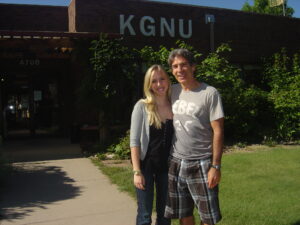
Concert of the week in Grateful Dead history: February 19, 1973 (Listen Now)
The heat came ’round and busted me for smiling on a cloudy day.
By The Deadhead Cyclist
For Week
8
Jerry Garcia was repeatedly in trouble for skipping classes, and was discharged from the U.S. Army after repeatedly going A.W.O.L. Bob Weir was expelled from nearly every school he attended. And I was suspended for refusing to interrupt a marching band practice I was leading when then-Governor Ronald Reagan visited my high school in Anaheim, California. The common threads are a rebellious attitude towards authority, intertwined with having endured a series of punishments for merely following the well-known Shakespearean principle (as stated by Polonius in Act 1, Scene 3 of “The Tragedy of Hamlet, Prince of Denmark”):
This above all: To thine own self be true.
Although I could never have known it at the time, I was practicing being true to myself years earlier as a 6th grade student at Park Knoll Elementary School in my hometown of St. Louis Park, Minnesota. On the chalkboard at the front of the classroom was the name, Mrs. Gravley, an aptronym as, well, apt as a golfer named Woods, a sprinter named Bolt, or a sexting politician named Weiner, suggesting that she may have married Mr. Gravley as much for his surname as anything else. Indeed, there was nothing smooth or forgiving about this classic schoolmarm, as I was about to learn when I gave myself what I thought was a rather innocent extracurricular assignment.
Cory Gravley was old-school to the nth degree, and her signature anachronistic expressions were as frequent a topic of conversation among my classmates as the latest weekly Batman episode. Her chronic use of words that would have been perfectly suitable for an early 20th Century Urban Dictionary – such as, “la-di-da,” “ditty,” and “malarky” – were liberally sprinkled throughout each school day and punctuated with longer expressions, such as, “Now you’re cooking with gas!” Following suit contemporaneously, I would describe Mrs. Gravley as a “oner.”
If Jerry Garcia and Bob Weir had known they would one day become THE Jerry Garcia and Bob Weir, they would have been better prepared to justify their truancy to their teachers, principals and military officers. After all, what did attending boring classes or serving in the military have to do with becoming a famous musician and multi-generational cultural icon? Similarly, if I had known that I was destined to become a journalist, publisher, and author, I would have been better equipped to put forth an open-and-shut defense when the aforementioned “extracurricular assignment” fell into Mrs. Gravely’s prosecutorial-inclined hands.
Having observed my teacher’s linguistic stylings, I had decided to document them, one by one, in a spiral notebook, fittingly titled, “Mrs. Gravley’s Vocabulary.” Given my proclivity for keepsakes, there’s little doubt that I would still be in possession of my first journalistic piece if I hadn’t left it on the school playground one fateful afternoon, where it was confiscated by the teacher on duty and promptly delivered to its namesake. I knew I was in serious trouble when Mrs. Gravley asked me to remain in the classroom after the final bell of the day had sounded.
There was no discussion, no display of emotion, and no hope of escaping with a mere warning. And there would certainly be no leniency out of deference to the creativity of a budding young journalist. Not a chance. I was to be taught a lesson, and my punishment had been carefully designed to fit the crime. In place of my notebook I was presented with a long list of quadrisyllabic, pentasyllabic, and hexasyllabic words I was to look up and provide written definitions for as a precondition of returning to school the next day. And, of course there was also the dreaded stipulation: My parents were to affix their signatures at the bottom of the page.
Atop the document were three words: Mrs. Gravley’s Vocabulary.
We all confront people and situations that attempt to prosecute us for being who and what we are. Never allow anyone to make you feel bad or wrong for “smiling on a cloudy day.”
According to the American Press Institute, “Journalism is the activity of gathering, assessing, creating, and presenting news and information.” Further, “Journalism’s first obligation is to the truth.” By that definition, my project stands undeniably as my first foray into my lifelong career as a journalist. Nevertheless, in the final act of an incident that exposes the obvious limitations of the mainstream American educational system, I took my medicine and faithfully completed my punitive assignment.
At the same time that I was being disciplined for doing nothing more than being true to myself, my fellow rebels, Jerry Garcia and Bob Weir, were playing their first concerts as the Grateful Dead. Having survived the punishments they endured for simply being who they were, the two musicians were on their way to becoming the progenitors of a movement that would inspire millions in the direction of authenticity in a world doing its damnedest to rob us of our innate individuality.
Some seven years down the road, the Grateful Dead took the stage on This Week in Grateful Dead History for a show at the International Amphitheater in Chicago, on 2/19/73. While listening to the superb second set of this show, I found myself on two wheels, making my way over the causeway from Fort Myers to Sanibel Island, and was struck by the symmetry between a rare cloudy Southwest Florida day, and the penultimate line of the first verse of the song, The Other One:
But the heat came ’round and busted me for smiling on a cloudy day.
As I struggled against a stiff headwind coming off the Gulf of Mexico, I thought about other Cora Graveleys in positions of authority, “the heat,” poised to pounce when we dare to color outside the lines of their too often arbitrary rules of propriety. By asserting that we are on the wrong side of the law when we are caught “smiling on a cloudy day,” they justify the deployment of controlling punitive measures. But it’s our choice whether to submit or contest.
Despite, or perhaps as a direct result of the challenges associated with my first journalistic exercise, I’ve spent my life questioning authority, and proudly displaying the title of “rebel,” as pictured here with my daughter, Julia, prior to a radio interview on the occasion of the 15th anniversary of the first edition of my newsmagazine, Boulder Weekly. Sadly, Mrs. Gravley died in 1991, two years prior to the launch of the business. It would have been fun, and somehow vindicating, to share with her a story of which she was only able to see the first chapter, and had most likely long since forgotten.

There are few things more worth fighting for than our essential nature. I call it personal justice. We all confront people and situations that attempt to prosecute us for being who and what we are. Whether this is connected to our beliefs, the way we look, whom we choose to love, where our particular talents lie, or any other intrinsic quality, never allow anyone to make you feel bad or wrong for “smiling on a cloudy day,” so long as doing so is a true expression of yourself.
Perhaps most importantly, every one of us as an individual is essential to the whole, and as such achieving personal justice is the surest, perhaps the only path to a just society. Shakespeare recognized this in the often omitted conclusion to the famous passage with which we began:
This above all: To thine own self be true.
And it must follow, as the night the day,
Thou canst not then be false to any man.
Concert of the week in Grateful Dead history: February 19, 1973 (Listen Now)
Subscribe and stay in touch.